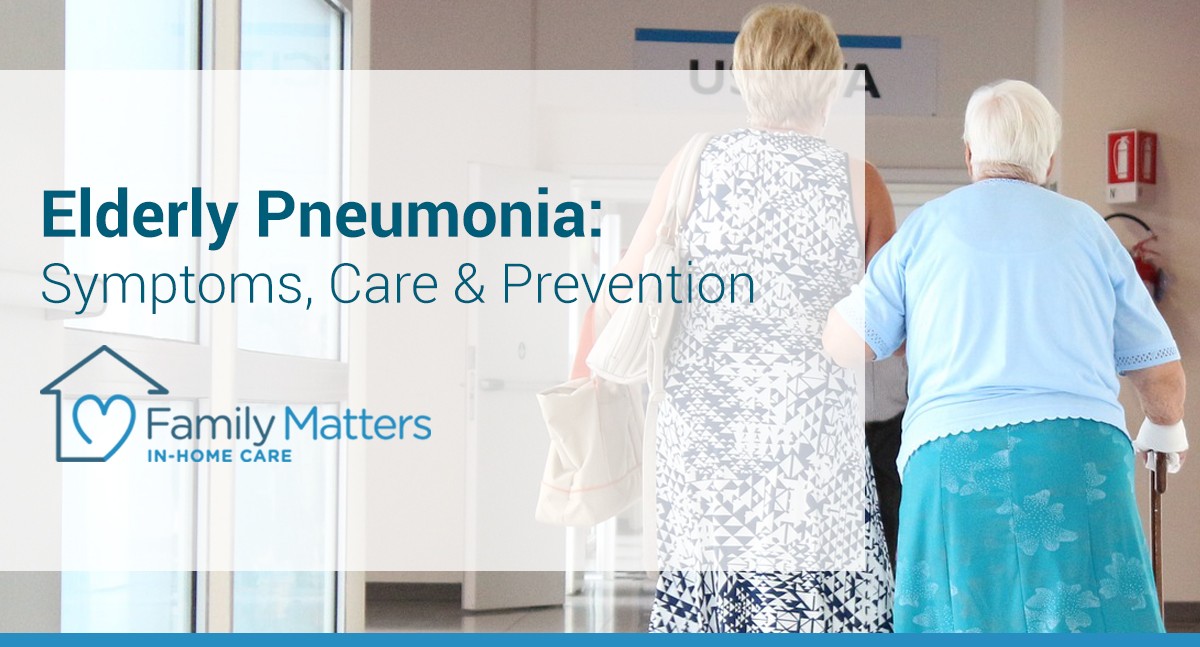
Elderly Pneumonia: Symptoms, Care & Prevention
Pneumonia starts by breathing germs, or bacteria, into the lungs and often occurs following a cold or flu. Healthy adults typically recover quickly from pneumonia with proper treatment, however the same cannot be said for elderly people. Pneumonia is a major cause of death among seniors aged 65 and older, and studies show that the annual incidence of pneumonia among older adults is four times higher than younger populations.
Elderly people are more likely to get pneumonia for several reasons. Seniors often have other health conditions that make them more prone to developing infection, such as heart disease and diabetes. As seniors age, their immune system response also becomes weaker, making it harder to fight infection. For example, a young person will cough to clear their lungs, while a more frail elderly person may not be able to clear secretions from their lungs. Those secretions then travel down to the bronchial tubes and cause infection. It is believed that seniors tend to show signs of pneumonia differently as well, making it harder to diagnose and treat early on.
Symptoms of Pneumonia to Look For:
- Coughing
- Fever
- Confusion
- Chills
- Shortness of breath
- Chest pain
- Green or yellow sputum (phlegm) that comes up when coughing
- Feeling weak or lethargic
- Suddenly feeling worse after having had a recent cold or flu
It’s important to know that seniors often show fewer, or milder symptoms. They might not have a fever. Or, they might have a cough but not produce phlegm. A predominant sign of pneumonia in elderly people is often a change in how well they think. They might seem confused or delirious. Additionally, if there is underlying dementia, they might not be able to communicate how they are feeling.
Caring for Pneumonia
A doctor is able to indentify pneumonia using chest X-rays and a phlegm or blood test. Bacterial pneumonia is almost always treated with antibiotics. If the infection is caused by a virus, it might be treated with an anti-viral medicine, or simply bed rest.
Make sure your loved one follows the doctor’s instructions when taking medications. Be aware of any potential interactions with other medications they are taking and watch for side effects. Caregivers can also help their elderly loved one by making sure they drink plenty of fluids, eat properly, and get plenty of rest.
Preventing Pneumonia
Pneumonia occurs when a person’s immune system is compromised, making it harder to fight infection. Here are some steps to take to help prevent pneumonia:
- Get the pneumococcal vaccine. This vaccine helps guard against 23 strains of bacterial pneumonia. Experts recommend getting the first dose of this vaccine between ages 50 and 60, and the second at age 65.
- Get an annual Influenza Vaccine (Flu Shot). Pneumonia often occurs after an initial bout of the flu leaves the immune system compromised. Older adults and caregivers should get a flu shot every year.
- Wash your hands often. Washing your hands is especially important to stop the spread of viruses and bacteria, and prevent infection.
- Take good care of your teeth. Pneumonia infections can occur around infected teeth, making proper dental care a must.
- Practice healthy habits. Exercise, rest and healthy eating can all help boost the immune system, making it easier to help fight infection.
Because pneumonia can be life threatening for seniors, it’s critical to take preventive measures against infection. If you think your elderly loved one might be showing symptoms, seek medical attention as soon as possible. Early pneumonia intervention can make a life-saving difference.
If your loved one lives on their own, it may be helpful to have a caregiver present that can help monitor their health and alert family members at the first sign of illness. Contact Family Matters In-Home Care today for a free in-home consultation to see how we can help your loved one stay safe and healthy living at home.
